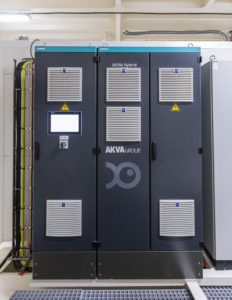Bright sparks


AKVA group hybrid cabinet’s also let you track your energy use to show the difference the system is making.
Investing in a diesel-electric hybrid system for feed barges means major savings
Advancements in technology can bring about exciting innovations that can change the gold standard in various industries. Advancements in battery technology are expected to make an impact in many areas, aquaculture being one of them, and AKVA group want to ensure that no one misses out. AKVA group’s hybrid solution can be fitted on to new barges and retrofitted to older barges to reduce production costs and emissions.
The benefits of running hybrid technology on feeding barges range from reducing CO2 emissions to reductions in noise pollution. Diesel generators running idle are a very inefficient way of producing electricity. Nevertheless, this is the reality on most feed barges today. Even though the power demand is low for much of the day, the main generator is running, and only a small amount of its capacity is being used. This means that most of the diesel consumption is wasted, and both the crew and the local environment are being exposed to noise and emissions that could easily have been avoided. A hybrid energy solution on the feed barge will rely on battery power throughout most of the day, using diesel generators to recharge the batteries only when necessary. For a feed barge in full operation, this means that diesel generators will be running up to four hours a day. They are automatically switched on when required and the operator can easily keep track of energy management from a tablet or smartphone.
The reduction in the use of diesel generators also leads to big reductions in running costs. With a hybrid solution, you will reduce diesel consumption by 70–80%. An approximate calculation predicts that you will recover the investment in a battery pack in two fish stocking cycles , depending on site usage pattern. Akva group’s smart system utilising Tesvolt with Samsung technology is warrantied for 6000 charging cycles. The expected operational life is around 20 years, so the return on investment will be significant. On feed barges that can accommodate solar panels or access a shore connection the potential gain is even bigger, both financially and environmentally. The battery packs will be charged by off-peak power or from solar cells when the weather permits, and from generators when necessary. This will all take place seamlessly without any interference from the operator.
In principle every barge is retrofittable which means that there is huge amount of both savings and reduced emissions that can be realized. The AKVA group solution is turnkey. No effort is required from the customer before installation.
The process starts with an assessment in which we analyse the operational energy use case at the location. Based on this, we specify whether a small, medium, or large hybrid solution is the optimum choice. We also calculate the potential savings from converting to hybrid operation, from which we can predict the payback period for the investment. Approximately 12 weeks after the completion of signing a contract the system can be set up and running, reducing both emissions and costs.
If you would like more information, please contact Donald Fowler at dfowler@akvagroup.com

Captions:
Featured: AKVA group barge operation a fully hybrid system. These systems can also be retro fitted on to older barges.

